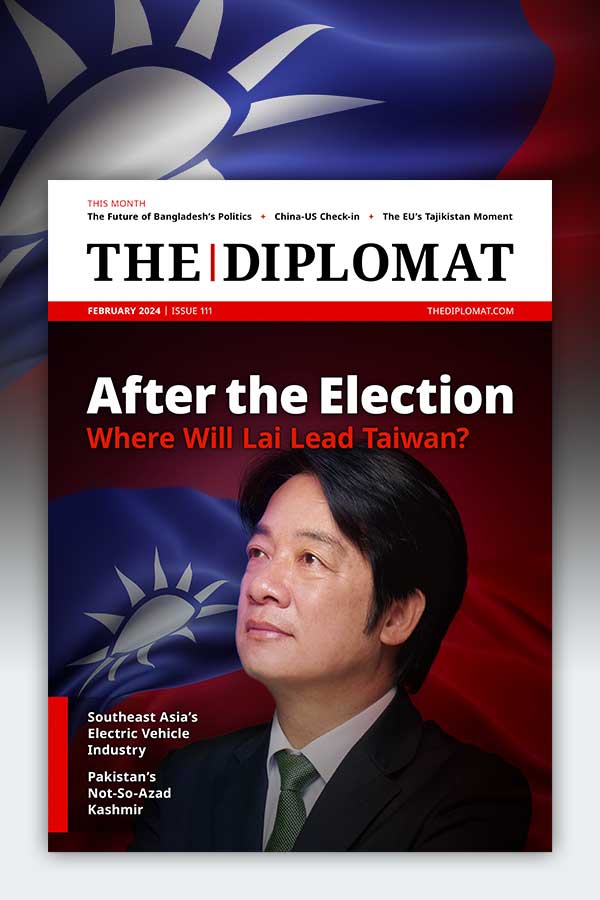| Welcome to the latest issue of Diplomat Brief. This week our top story explores the state of Japan’s economy as its central bank eyes a crucial change in monetary policy. We also have an interview with Pakistani political and security affairs expert Aqil Shah on Pakistan post-election and the military’s role in politics. |
| Story of the week | ![[object Object]](https://thediplomat.com/diplomat-brief/2024/vol08/images/feature.jpg?v=1) | Economy The Bank of Japan’s Year of Living DangerouslyWhat Happened: With Japan finally registering inflation above or close to the Bank of Japan’s longtime goal of 2 percent, many observers expect the end of negative interest rates. That “ultra-easy” monetary policy has been in place since 2016, as Japan sought to combat persistent deflation. BOJ Governor Ueda Kazuo hinted at the bank’s January meeting that a continuation of the “positive wage-inflation cycle” could lead to policy changes. Our Focus: As Nikko Asset Management put it: “In 2024, the government will be waiting for the right moment to officially announce victory over deflation, although the exact timing of this will largely be a function of political dynamics.” The decision comes at a fraught time; Prime Minister Kishida Fumio is still struggling to bring about wage increases, a key plank of his economic policy. Rising incomes are a must to boost Japanese consumption and keep the economy moving forward. What Comes Next: Many financial analysts are expecting the BOJ to finally scrap negative interest rates following the bank’s April meeting. The policy decision – and the economic fallout – could make or break Kishida’s re-election bid in the LDP presidential race this September (which will also determine whether Kishida maintains the prime minister spot). Facing dismal approval rates, Kishida needs an economic win to bolster his position. Read this story |
| Behind the News | INTERVIEW Aqil ShahAqil Shah, the author of “The Army and Democracy: Military Politics in Pakistan” on Pakistan’s political future: “The contested election results are likely to deepen Pakistan’s persistent political instability… A coup may not be imminent, but it is fair to say that Pakistan is unlikely to come out of its enduring praetorian trap (marked by a bewildering cycle of coups, military governments, civilian rule, and so on).” Read the interview |
| This Week in Asia | Northeast Asia South Korea’s ‘Third Party’ PoliticsAs South Korea heads toward legislative elections in April, President Yoon Suk-yeol and his PPP face dragging approval ratings. But the opposition Democratic Party (which currently controls the National Assembly) isn’t winning the hearts and minds of voters, either. Since politics abhors a vacuum, a range of figures are rushing to offer up alternative parties – most notably, the New Reform Party, founded by PPP defector (and former party chair) Lee Jun-seok but co-chaired by former DP chair Lee Nak-yon. Can the fledgling party bridge the divide between its various political factions? Find out more | South Asia India’s Farmer Protests ContinueIndian farmers are marching to Delhi yet again, this time protesting the Modi government’s alleged failure to deliver on the promises made to end the protest movement in 2020-21. Last-ditch negotiations fell apart this week, with the farmers rejecting an offer from the government to give a temporary minimum price guarantee for a limited number of crops. Indian authorities have barricaded highways leading to the capital in a bid to prevent the march. Find out more | Southeast Asia Former Thai PM Walks Free After ParoleThis week, Thailand’s former Prime Minister Thaksin Shinawatra was released on parole from a police hospital in Bangkok, where he had spent the past six months serving a sentence for corruption-related charges dating from his time in power. The rehabilitation of Thaksin, who returned from 15 years of self-exile in August 2023, draws a line under the two-decade-long political struggle between Thailand’s conservative establishment and the populist political machine that the former leader established in the early 2000s. This was enabled by a significant political realignment that has taken place since last year’s election. This was won by the Move Forward Party, a more radical alternative to the Thaksin-aligned Pheu Thai, which subsequently formed a government with the military-backed parties that it once staunchly opposed. The question now turns to what influence the 74-year-old politician, who is reportedly dealing with a range of health issues, might have over the current government. Find out more | Central Asia Japan’s Important But Silent Role in Central AsiaTokyo is a quiet but important partner to Central Asia, with notable engagement on projects related to the Aral Sea. Work regarding the Aral Sea helps Tokyo maintain a positive presence in Central Asia in a way that does not appear threatening to other regional powers, like China or Russia. Find out more |
| Visualizing APAC |  | The waters between Xiamen, a city on the Chinese mainland, and Kinmen, islands controlled by Taiwan, have become a point of contestation between the two coast guards. See the full picture |
| Word of the Week | Politics दिल्ली चलोDilli Chalo: Literally meaning “on to Delhi” in Hindi, the phrase has become the mantra of the farmers’ protests in India. Find out more |
|  |

![[object Object]](https://thediplomat.com/diplomat-brief/2024/vol08/images/feature.jpg?v=1)

